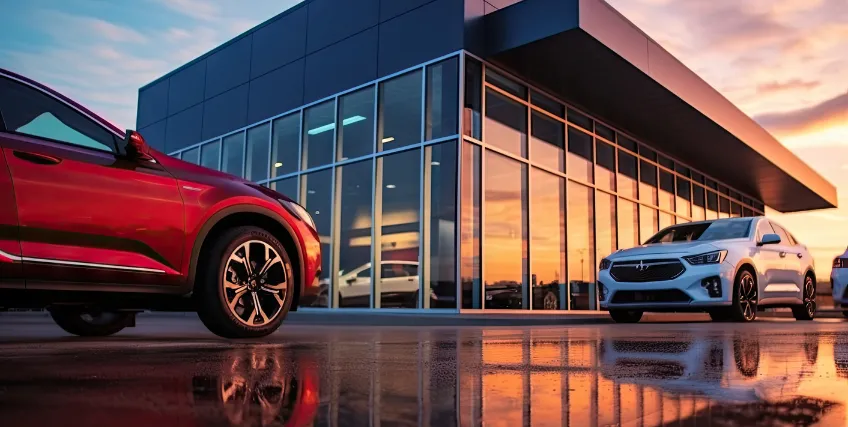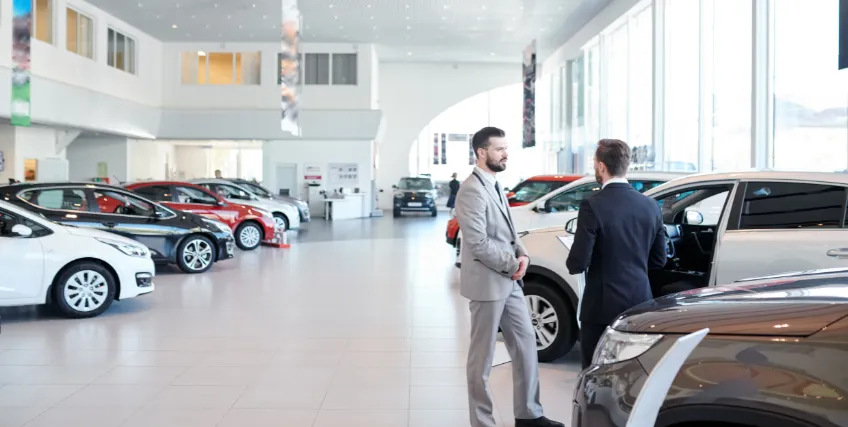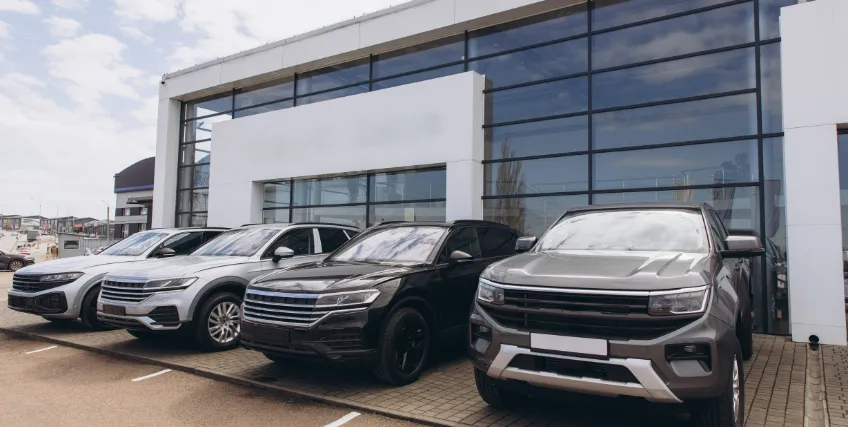Car Dealership Business Loans: Tips to Qualify and Grow Your Dealership
Sep 12, 2025 | Last Updated on: Sep 15, 2025

Successfully running a car dealership requires more than just a good location and a lineup of great vehicles. You’ll also need substantial financial support to manage your inventory, cover monthly expenses, market your business, and plan for future growth. For these expenses, many dealers find themselves turning to car dealership business loans to keep operations moving and set themselves up for long-term success.
Whether you’re just getting started or looking to expand your business, understanding your financing options can make all the difference. Here’s a look at all of the main types of car dealership business loans, how to qualify, and tips to help you get approved.
Why Car Dealerships Rely on Business Loans
Car dealerships often face financial pressures that would be uncommon in other industries. Just keeping new cars on the lot can add up to hundreds of thousands of dollars, and vehicles may not sell immediately. While waiting for sales, dealership businesses still need to cover expenses such as rent, payroll, insurance, utilities, and marketing.
This is where car dealership business loans come in. These loans give borrowers the ability to meet a variety of business needs, like:
- Purchase new and used cars upfront
- Cover slow sales periods or seasonal slumps, when cash flow is low
- Fund renovations or expand to a new location
- Hire additional staff
- Invest in new technology
For example, a dealership that wants to expand into electric vehicles may use a dealer finance loan to purchase inventory, install charging stations, update signage, and train staff, all while managing existing expenses.
Common Types of Car Dealership Business Loans
Several types of financing are available for car dealers. Choosing the right one depends on your goals, credit profile, and how quickly you need the funds. Here are some of the most common car dealership business loans available.
Inventory Financing
Also known as floor plan loans, this type of short-term loan is designed specifically for purchasing vehicle inventory. Lenders pay the vehicle manufacturer or wholesaler directly, and you repay the loan to the lender as each car is sold. The inventory itself generally acts as collateral to secure these loans, so they may be easier to obtain for small startup dealerships or those without a lengthy credit history. Inventory financing helps dealerships stock their lots without tying up cash reserves.
Term Loans
A business term loan offers a lump sum of money that is then repaid over a fixed period, typically with monthly payments and interest. These car dealership business loans are beneficial for significant, one-time expenses such as renovations, equipment upgrades, or marketing campaigns.
Term loans are available through a wide range of financial institutions, including banks, credit unions, and business lenders. They often have competitive interest rates and flexible repayment options. Depending on your eligibility criteria and requested loan amount, you may be able to get approved quickly.
Business Lines of Credit
A line of credit is a revolving account that remains open and allows you to borrow funds as needed, up to your set limit. Similar to a credit card, interest on a line of credit is only charged on the amount you borrow (though there may be annual fees and other costs involved).
Many dealerships use lines of credit to provide day-to-day working capital or bridge temporary cash flow gaps, especially since the funds are available on demand and hassle-free, without needing to submit a new loan application or go through the loan eligibility process. As you pay down the borrowed balance, your line of credit will renew so you can borrow again.
SBA Loans for Car Dealerships
SBA loans for car dealerships are available through many different lenders and are backed by the U.S. Small Business Administration (SBA). Because of this reduced risk, SBA loans are known for offering lower interest rates and longer repayment terms than many other types of car dealership business loans. Some commonly used options are SBA 7(a) and SBA 504 loans, which offer up to $5 million in funding that can be used to purchase real estate, consolidate debt, fund supply chain changes, and more.
While SBA loans for car dealerships can be a great option, it’s important to note that there are some restrictions that may apply to used car dealers or franchises.
To be eligible for an SBA car dealership business loan, the business must be:
- A for-profit entity located in the U.S.
- Operating within the SBA’s size standards
- Able to demonstrate the ability to repay the loan
- Using the loan for an approved business purpose
Many lenders won’t offer SBA loans to car dealerships, particularly for used car businesses, so try to find a lender who understands the auto industry and has experience processing these types of applications.
Also note that the SBA loan application process is notoriously lengthy, so this isn’t a good option if you need cash fast. Expect to provide a fair amount of supporting documentation — like a business plan, recent tax returns, and bank statements — as well as meeting any of the lender’s credit score and business history requirements.
Qualifying for Car Dealership Business Loans
Getting approved for a car dealership business loan requires preparation, regardless of how much you need to borrow or why. Lenders will review your credit history, business performance, and overall risk before making a decision, and they will also care about how you plan to use the funds.
Here are some of the most common criteria used to determine eligibility:
- Credit scores: Both personal and business credit scores will be reviewed, especially if your dealership is newer or doesn’t have a lengthy enough history. Carrying a strong credit score increases your odds of approval and usually unlocks lower interest rates.
- Financial documentation: Lenders will want to see things like tax returns, profit and loss statements (P&Ls), balance sheets, and bank statements as part of the loan application review process.
- Business plan or loan proposal: By explaining how you will use your new car dealership business loan and its role in business growth, you demonstrate that you have a clear plan in place. And that can increase your chances of approval.
- Collateral: For larger loans, lenders may ask you to put up collateral to secure the loan, such as property, inventory, or business equipment. There are also collateral-free car dealership business loans available, but they can have higher interest rates, lower loan limits, or more restrictive repayment terms.
For example, a dealership that can show consistent revenue, strong customer demand, and a clear strategy for using funds is more likely to secure favorable loan terms.
Choosing the Right Lender for Your Dealership
Not all lenders offer the same terms and loan opportunities, and some are better suited for car dealership business loans than others. Depending on your needs, you might consider borrowing from financial institutions like:
- Traditional banks, known for offering low interest rates and longer terms, typically require strong credit and a lot of paperwork.
- Online lenders usually offer fast funding and more flexible qualifications, but can sometimes come with higher interest rates.
- Credit unions can have community-based options that offer better service and lower fees.
- Captive finance companies, or financial institutions affiliated with auto manufacturers that specialize in providing financing to dealerships.
Choosing a lender with experience working with car dealerships can simplify the process and improve your chances of getting the loan you need, when you need it.
Using Business Loans Wisely
Once you secure funding for your dealership, it’s important to use that money strategically. Car dealership business loans should align with your goals and budget, and be managed carefully to avoid taking on any unnecessary debt.
For instance, if you're using the loan to buy commercial vehicle inventory, make sure your sales projections and process can adequately support your promised repayment schedule. If you’re borrowing to cover operations costs, borrow only what you need to avoid overextending your cash flow.
If you’re taking out a car dealership business loan for expansion purposes, be sure to research your market thoroughly and create a solid business plan to ensure your investment will pay off. A dealership planning to open a second location, for example, might use a loan to fund lease deposits, hire new staff, and market the location to new customers in the area.
With a solid plan in place, your car dealership business loan becomes a valuable growth tool rather than a financial burden.
Final Thoughts
If you own a dealership —or plan to open one in the future — securing the right financing is essential for the business’s success and stability. Whether you need to stock up on vehicles, renovate your showroom, or expand into a new market, car dealership business loans offer the financial flexibility and support to help you reach your goals.
Before you start applying for car dealership business loans, though, be sure to research and understand all of your funding options. By preparing your documentation and working with the right lender, you can not only make it easier to take out the funds you need, but you’ll also position your business for sustainable growth.
FAQs on Car Dealership Business Loans
Can a new dealership qualify for a business loan?
While new dealerships can qualify for business loans, they will likely need a detailed business plan and, in some cases, collateral to secure the debt. Depending on the lender and type of loan, your loan approval may also hinge on your personal credit history.
Are SBA loans available for used car dealerships?
SBA loans can sometimes be a viable funding option for used car dealers, but that depends on the structure of your business and the lender you choose. Not all lenders offer small business loans for car dealerships, particularly when you’re dealing in used inventory.
What type of loan is best for buying vehicles?
The best loan depends on your specific business and purchasing needs. For example, inventory financing, also known as a floor plan loan, is a common car dealership business loan used to purchase vehicle inventory, and is secured by the cars it’s being used to buy. An SBA loan, on the other hand, might be a better choice for borrowers who qualify and need to purchase cars in bulk.
How long does it take to get approved for a loan?
The lead time for a car dealership business loan depends on the type of loan and lender you choose, as well as your eligibility criteria. If you qualify, business loans through an online lender, a credit union, or a traditional bank can take just days (or less). SBA loans, on the other hand, typically take weeks to underwrite and process.
Is collateral always required for a dealership loan?
Larger car dealership business loans often require collateral to secure the debt, which can be assets such as property, inventory, or equipment. However, collateral is not always required for dealership loans.
Frequent searches leading to this page
Term Loans are made by Itria Ventures LLC or Cross River Bank, Member FDIC. This is not a deposit product. California residents: Itria Ventures LLC is licensed by the Department of Financial Protection and Innovation. Loans are made or arranged pursuant to California Financing Law License # 60DBO-35839




